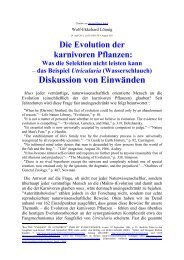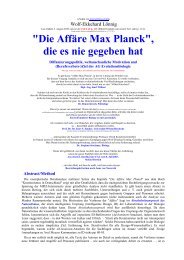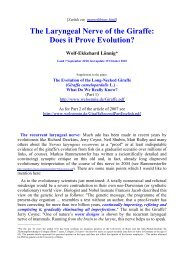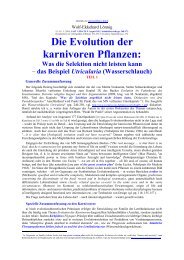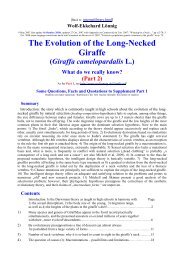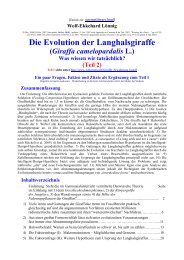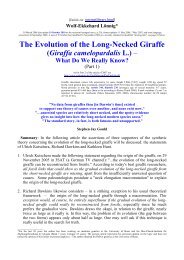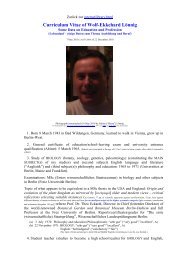Unser Haushund: Eine Spitzmaus im Wolfspelz? - Wolf-Ekkehard ...
Unser Haushund: Eine Spitzmaus im Wolfspelz? - Wolf-Ekkehard ...
Unser Haushund: Eine Spitzmaus im Wolfspelz? - Wolf-Ekkehard ...
Erfolgreiche ePaper selbst erstellen
Machen Sie aus Ihren PDF Publikationen ein blätterbares Flipbook mit unserer einzigartigen Google optimierten e-Paper Software.
125Die Domestikation von <strong>Wolf</strong> und Fuchs widerlegt Dawkins und alle weiterenoben genannten Autoren, die ähnliche Ansichten vertreten wie er, gleich aufmehreren Ebenen:(1) Nicht kontinuierliche Evolution 216 , sondern diskontinuierliche Veränderungensind die Hauptgrundlage der Domestikation.(2) Nicht Aufbau, sondern Abbau von genetischen und/oder anatomischenStrukturen sowie entwicklungsphysiologischen Prozessen (d. h. generell Abbau vonIntegration und Information) sind die Hauptursachen der Veränderungen.(3) Einige der 'neuen' Merkmale scheinen überhaupt nicht genetisch bedingt zu seinund zeigen entsprechend keine Mendelsche Spaltung (vielleicht Epigenetics).Wiederholung/Ergänzung: Dawkins [with some supplementary remarks and inferences]: "Bear in mind thisorder of evolutionary change [from <strong>Wolf</strong> to Chihuahua due to a series of genetic and anatomical dysfunctions], andthen extrapolate backwards twenty thousand t<strong>im</strong>es as far into the past. It becomes rather easy to accept thatevolution” [and now the correct inference] from a fish into a human has never happened at all.W-E L: And all the parallel losses of functions/deterioration of integration on the genetical and anatomical levels inthe fox domestication exper<strong>im</strong>ent reinforce this conclusion.Dawkins: "…evolution most certainly is progressive.” And Dawkins slightly corrected in agreement with the factsdiscussed above: "The number of clues, the sheer weight of evidence, totally and utterly, sledgehammeringly,overwhelmingly strongly supports the conclusion that [macro-]evolution is untrue.”Und vielleicht noch Trut et al. (korrigiert): "…the exper<strong>im</strong>ent with fox domestication has demonstrated whattremendous [genetical, physiological and anatomical loss-of-function] potential may be released by selectionvectorized for behaviour [in the special cases of the foxes and dogs (and perhaps also other canids not yetinvestigated), an <strong>im</strong>portant discovery which, however, can only partially be generalized for the other 20 or sodomesticated an<strong>im</strong>al species – see, in contrast, the example of the domesticated cat].”13. Modifikationen, Dauermodifikationen undEpigenetics216 Nach Ernst Mayr (1904–2005; "Berühmt wurde Mayr als Hauptvertreter der "Synthetischen Theorie der Evolution"" [http://de.wikipedia.org/wiki/Ernst_Mayr]) verläuft die (Makro-)Evolution über Mutationen mit ganz geringen Auswirkungen auf den Phänotyp: "In due t<strong>im</strong>e it was realized that the spectacular De Vriesianmutations were exceptional phenomena and that the normal genetic changes were "small” mutations (Baur, East, Johannsen, Morgan) which […]have only slight or even invisible effects an the phenotype” (Mayr 1970, p. 169). "Macroevolution (evolution between species) is composed ofnumerous small microevolutionary steps (additive typogenesis)" – Kutschera 2001, p. 250. Or: "Uncountable successive smallmicroevolutionary steps have led to large changes in the body forms of organisms in the course of millions of years (macroevolution,concept of additive typogenesis)" – Kutschera 2006, p. 204. Nach Hinweis auf Bergson und Driesch schreibt Mayr (1997, p. 33): "Others haveappealed to saltation as the source of the sudden origin of new perfections. Such capitulations to the unknown have had a paralyzing effect onthe spirit of scientific inquiry. They have proven themselves utterly sterile pseudo-solutions and are unan<strong>im</strong>ously rejected by those whohave a grasp on modern evolutionary theory and of modern genetics” (Evolution and the Diversity of Life, 1976, Fourth Printing 1997).Im deutlichen Widerspruch zu dieser soeben zitierten ult<strong>im</strong>ativen Aussage schreibt Mayr 1997, pp. 346/347 unter der Überschrift "The Benefitof Controversies” nach Hinweis auf die Kontroversen zwischen Mendelians and biometricians, Bateson und Morgan und anderen: "In someinstances, however, such a controversy is beneficial [instead of utterly sterile etc.] because it forces both sides to analyze their argument and tomarshal supporting facts. I doubt that I would have written my Sytematics and the Origin of Species (1942) if I had not been provoked byGoldschmidt's cla<strong>im</strong>s in his Material Basis of Evolution (1940) [almost the entire book of Goldschmidt is devoted to saltationism] that geographic speciation is anirrelevant evolutionary process.” (Kursiv von Mayr.)Mayr, 1997, pp. 34, 35, 308/309 (Auszüge): "It is now believed that many, if not most, mutations have only slight effects or are entirelyinvisible because they affect only nonmorphological characters.” […] "The smaller the effect of a mutation, the greater the probability thatit will be advantageous.” […] "…indeed there is no difference between mutations and and the so-called small variations which Darwin andthe naturalists had regarded as the principal material of evolution.” (Diese Auffassung gilt bis heute: Vgl. http://www.weloennig.de/Utricularia2010.pdf, p. 6, Fußnote 10.)W-E L: In fact, Darwin had provided the basic idea of continuous evolution some 150 years ago by postulating "innumerable slightvariations", "extremely slight variations" and "infinites<strong>im</strong>ally small inherited variations" (he also spoke of "infinites<strong>im</strong>ally small changes","infinites<strong>im</strong>ally slight variations" and "slow degrees") and hence <strong>im</strong>agined for macroevolution "steps not greater than those separating finevarieties","insensibly fine steps” and "insensibly fine gradations", "for natural selection can act only by taking advantage of slight successivevariations; she can never take a leap, but must advance by the shortest and slowest steps" or "the transition [between species] could, accordingto my theory, be effected only by numberless small gradations" (emphasis added, see http://darwin-online.org.uk/).Mayr 1970, p.1: "To be sure, the current theory of evolution […] owes more to Darwin than any other evolutionist and is built aroundDarwin's essential concepts” (Populations, Species, and Evolution. Cambridge, Mass.); ähnlich Mayr 1991, p. 163: "Darwin's theory ofgradualism […] has ult<strong>im</strong>ately triumphed decisively and makes more sense the more clearly we recognize that evolution is a process involvingpopulations” (One Long Argument); und 2001, pp. 75, 86, 87, 275: "…population thinking favors the acceptance of gradualism.” (What Evolution Is).



